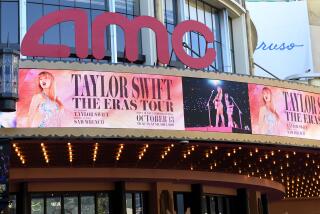Movie theaters are reopening. Here’s why our journalists are in no rush to return
The closure of movie theaters during the COVID-19 pandemic has divided and ruptured the movie industry. Some studios have responded by shifting major titles to home-streaming events (Disney’s “Hamilton” and “Mulan”), while others are sticking to their theatrical guns but testing out unusual release patterns (Warner Bros.’ “Tenet”). Times film critic Justin Chang sat down with entertainment columnist Glenn Whipp to discuss the risks of going to theaters and the challenges of writing about a medium in flux.
JUSTIN CHANG: What was the last movie you saw in theaters, Glenn? I won’t soon forget mine. I still remember the mood of mild trepidation as I headed to Hollywood on March 9 for the premiere of “Mulan,” Disney’s live-action remake of its 1998 animated film. Full-blown pandemic panic had not yet erupted, but tensions were in the air — and so, as we now know, was the coronavirus itself. Our minor precautions seem laughably inadequate in hindsight: After a few spritzes of hand sanitizer, hundreds of us sat in the enormous Dolby Theatre for more than two hours, crowded together, breathing the same air without masks. We were among the first to see the movie; deep down, some of us guessed we might be among the last for a while.
This turned out to be sadly correct. Theaters began closing in mid-March and “Mulan,” like so many 2020 studio titles, was postponed: Originally set for a March 27 release, it was moved back to July. A few months later, it was moved to August. Finally, accepting the reality of a situation that refused to improve, Disney announced that “Mulan” would skip theaters in most of the world and premiere Sept. 4 as a premium video-on-demand title on the streaming platform Disney+. Having kept quiet about “Mulan” for the last five months, I’ll continue to keep my thoughts on the movie under wraps until closer to Sept. 4, or whenever Disney lifts the embargo on reviews. It’s been so long that I’d need to see it again anyway — and when I do, it will be in the safety of my own home, rather than in a theater.
As you and I have written more than once this past summer, Glenn, we miss theaters terribly. For those of us who write about movies for a living, they have been not just a welcome escape but also the world’s greatest office, an environment where we can see new films under optimal conditions and report back to our readers — and, if a movie is good or interesting enough, encourage them to seek it out in theaters as well. Going to theaters of course hasn’t been an option during the pandemic. You and I and other Times critics have been reviewing films that have been available for streaming on demand; some of the titles we’ve covered have been playing at drive-in venues, a reasonably safe alternative.
But now that’s starting to change. It’s not happening in California yet, but theaters around the world and in the U.S. are steadily reopening, and not every new film is going the safe “Mulan” route and bypassing them. The new Russell Crowe thriller “Unhinged,” already playing overseas, slips into U.S. theaters, including several L.A. drive-ins, on Friday; I reviewed it from a home-viewing link. The Times will also review “Tenet,” “The Personal History of David Copperfield” and other titles that will only be available in theaters in the coming weeks.
All of which raises some questions about how we do our jobs and serve our readers: Can we, in good conscience, encourage our readers to see new films in bricks-and-mortar theaters? And is a positive or even remotely favorable review of such a film tantamount to encouragement?
GLENN WHIPP: What movie would actually prompt me to get off my couch, grab a face mask and a container of antibacterial wipes, drive to a theater, submit to a temperature check and then cautiously walk inside, praying to Jesus and Allah and Vishnu (I’m not taking any chances here, Justin) that the person sitting one seat over from me doesn’t go on a phlegm-rattling coughing fit 10 minutes after the lights go down?
Why, “Tenet,” of course. (That was a rhetorical question.)
I’m not serious (mostly). But I have felt like the golden retriever in “Up” the last couple of months, only in my case the “SQUIRREL” has been the periodic updates on when Christopher Nolan’s time-bending tentpole would land in theaters. Each announcement has turned me into Pavlov’s Dug, momentarily frothing at the news and then remembering that we’re still living in a pandemic and I’m not going to gamble my health just because Nolan believes that “Tenet” cannot wait until 2021 or, worse, that it’s so Important that we cannot possibly gaze upon it unless it’s on a big screen ... inside an enclosed space with recirculated air with a bunch of other people.
As theater chains reopen across the country, “Unhinged,” “Words on Bathroom Walls” and “Cut Throat City” lead the first wave of new movies to open in theaters amid the pandemic.
And if I have those misgivings about seeing “Tenet,” I don’t need to elaborate much on junk like “Unhinged” or “New Mutants” (the long-shelved “X-Men” spinoff that Disney inherited from Fox and will quietly open next week). I fully understand that theater chains are in desperate shape. I get the fear that the longer they remain closed, the harder it might be to persuade moviegoers to return. I don’t want people to lose their livelihoods.
But here’s the thing: People are savvy about their entertainment these days. Why should anyone return to theaters to see “Unhinged” when there are dozens of brutal thrillers available on streaming platforms? We go to the movies to escape (among many other reasons). Can you lose yourself in the darkness if you’re paranoid about the dude sitting two seats over who just lowered his mask so he can dig into a jumbo tub of popcorn? I can’t encourage audiences to go there. It feels like any review of a movie playing exclusively in theaters needs to come with the equivalent of a warning you’d find on a cigarette pack. DANGER: Watching bleak B-movies in a poorly ventilated environment can be hazardous to your health.
CHANG: You joke, Glenn, but our editors spent time this week crafting precisely that kind of language — albeit with a bit less gallows humor — to accompany our reviews of movies that are opening in theaters. Call it a disclaimer, a warning or an assertion of basic common sense: It explains to our readers that while The Times remains committed to covering new releases during the pandemic, they should be aware of the inherent risks of going to theaters right now and follow health and safety guidelines as outlined by the CDC and local health officials.
Some would argue that the better option would be for The Times and other publications not to cover such theatrical-only movies at all (or perhaps limit theatrical coverage to the drive-in circuit). I certainly see their point, and it’s one that you and I and our colleagues have pondered a lot these last few weeks: Wouldn’t it be more ethically sound not to reward reckless distribution and exhibition practices with media attention? Especially given the wildly erratic enforcement of social-distancing measures by major chains like AMC Theatres, which has been fighting especially hard for its survival this season (15 cents a movie?!).
I get those arguments. But my rejoinder to them — other than, y’know, I like my job and would like to keep doing it — is that they embody a fundamental misunderstanding of the purpose of arts journalism and arts criticism in particular. Yes, The Times’ movie reviews and features can function as a viewer recommendation service and shed valuable light on interesting, worthwhile films and the people behind them.
The thriller, directed by Derrick Borte, is one of the first new movies to open in U.S. theaters during the COVID-19 pandemic.
But I’d ask you, Glenn: How many reviews have you read of books that you didn’t wind up reading? How many articles have you read about TV shows you never caught up with, or dance shows and museum exhibits that you never got around to seeing? Did you regret the time you spent learning about those cultural experiences, regardless of whether that experience was your own?
Speaking as someone who fell in love with film criticism by reading reviews of countless movies he hadn’t seen yet — and many that he never had any intention of seeing — my point is that a voracious love for popular culture, and the discourse that helps sustain it, is a worthwhile and fulfilling pursuit for its own sake. Good reviews of good movies are always more than mere recommendations. Good reviews of bad or mediocre movies, for that matter, are always more than mere deterrents.

WHIPP: Really, Justin, the more pointed question for me would be: How many reviews have you read of books that you then bought and didn’t wind up reading? Enough to feel ashamed every time I walk by a bookcase in my house. But I appreciate your point. Speaking as a journalist, as well as a critic, I’ve been sorely tempted to volunteer to drive to Vegas and document what it’s like to see “Tenet,” the first tentpole movie of our pandemic times. Will theater workers and patrons follow the health and safety protocols? How many people will buy popcorn and a soda just so they won’t have to wear a mask? Will I be able to understand the film’s internal logic or will I have to risk my life a second time to fully appreciate the latest Nolan “masterpiece”?
But I’m going to pass. I’ve spent the last six months grilling my teenagers every time they venture into the outside world. Where are you going? Who else is going to be there? How have they been quarantining? Are you wearing a mask? Are you social distancing? You’re not driving together, right? I could go on. I have a mental checklist that I tick off daily. So I can’t justify tiptoeing into a multiplex, a place fraught with peril in the best of times. I once witnessed a woman change her infant’s diaper in an AMC movie theater. I’m not going to assume anyone’s going to behave themselves.
Really, what we’re doing is blundering about, making decisions based on the best information we have and puzzling over the contradicting messages we sometimes receive. New York Gov. Andrew Cuomo this week gave the OK for gyms to reopen but offered no timetable for movie theaters to resume business. A movie theater, he said, is “less essential and poses a higher risk” than a gym, which tells me that Cuomo has never worked out at a public fitness center next to the bro doing performative grunts by the dumbbell rack.
Anyway, I’ll follow the public discourse surrounding “Tenet” from afar with interest, hoping for the best because I’d like to return to movie theaters sometime soon too. But I’m going to wait until I know it’s safe for larger groups of people to congregate indoors.
CHANG: I’ll be following the “Tenet” discourse from afar too, Glenn, and it will be a bit surreal watching the movie take its sweet time getting to Los Angeles, a city that not too long ago was regarded as the moviegoing capital of the world. This month, after endless delays and changes of strategy, Nolan’s film is finally making landfall in cities and countries where movie theaters have cautiously reopened. These include London, where some of the movie’s first press screenings were held earlier this week. The Times will publish a review of “Tenet” this week written by my excellent London-based colleague Jonathan Romney; other major American outlets are making similar arrangements.
Why are we reviewing the film now, some might ask, weeks and maybe even months before L.A. moviegoers will be able to see it? Well, because the film — its quality, its fortunes, its status as a cultural and commercial object — has become intensely newsworthy. And because The Times, like most major newspapers, has more than a few readers outside Los Angeles and indeed the U.S.
I’m certainly eager to see “Tenet” myself, under safe (and, if safe, optimal) conditions, and hope to report back to our readers when I do. But it would be a mistake to say I can’t wait to see it. For all the reasons you expressed, Glenn, I certainly can wait. A very long time if necessary.
Debuting in 1998 after two major Disney animated bombs, the original “Mulan” had a low-key premiere and bare-bones marketing. Now the live-action version is going straight to Disney+. Is this any way to treat one of the best Disney characters ever?
I say that as an admirer of Nolan’s work, which can be dazzling, maddening and intensely polarizing, much like the director himself. I have a lot of patience with Nolan’s high-priest-of-cinema routine, his ardent defense of the theatrical moviegoing experience in a world of iPhones, streaming platforms and now coronavirus. I also wish that, in a life-or-death situation, he and Warner Bros. weren’t thrusting “Tenet” and its theaters-only release strategy so insistently into the spotlight. I understand the challenges of holding back a movie by a year or two when millions of box-office dollars hang in the balance, but if streaming is off the table, what’s the alternative? The very word “Tenet” — a title that threatens to become meaningless with each repetition — seems to convey Nolan’s own refusal to compromise.
I’ll end by noting that I have seen many of Nolan’s films several times in theaters, first with a press crowd, and then again with a regular audience. You joke, Glenn, about the multiple viewings that Nolan’s movies sometimes demand (or presume to demand), but there’s a special joy in rewatching a movie you like with an audience discovering it for the first time. I remember rewatching those stunning Imax sequences in “The Dark Knight,” or Joseph Gordon-Levitt’s gravity-defying Fred Astaire routine in “Inception,” and quickly glancing sideways at my fellow moviegoers, seeing them in blissful thrall to a movie that was hellbent on not just entertaining them but sweeping them up in its grip.
I imagine that is what Nolan wants to do for us again with “Tenet,” and I hope he will. But to be swept away by a movie in a theater demands a lot from us, and not until the COVID-19 era, perhaps, have we been able to fully appreciate the cost. It demands a complete emotional and intellectual surrender, a temporary abandonment of our waking reality and our reason. Most of all, perhaps, it demands something that most of us cannot afford to give: a sense of trust and solidarity with the precious, vulnerable strangers in our midst.
More to Read
Only good movies
Get the Indie Focus newsletter, Mark Olsen's weekly guide to the world of cinema.
You may occasionally receive promotional content from the Los Angeles Times.













